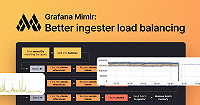Important: This documentation is about an older version. It's relevant only to the release noted, many of the features and functions have been updated or replaced. Please view the current version.
Set up the GEM plugin for Grafana
Requirements
Grafana Enterprise 7.3.0 or higher.
Refer to Deploy Grafana Enterprise on Kubernetes if you are using Kubernetes. Otherwise, refer to Install Grafana for more information.
Install the plugin in your GE instance
There are multiple ways to install the plugin to your local Grafana Enterprise instance. For more information, refer to Grafana Enterprise Metrics app installation.
Enable and configure the plugin
- Log in to your Grafana Enterprise instance.
- Go to the Config/Plugins page and select the Grafana Enterprise Metrics plugin from list.
![Plugins page in Grafana Plugins page in Grafana]()
Plugins page in Grafana - From the configuration page of the plugin, enable the plugin by clicking on the Enable plugin button.
- Provide the necessary API settings so that the plugin can connect to your cluster:
- Access Token: Enter the admin-scoped access token that you generated when setting up your GEM cluster.
- Enterprise Metrics URL: Enter the URL of your GEM cluster. For single-process clusters, this is any node in the cluster. For microservice deployments, this URL is the GEM gateway.
- Click Save API settings.
- Verify that the plugin loads and can communicate with the GEM admin API endpoints.
- Navigate to the Grafana Enterprise Metrics plugin through the main menu to see the default access policy under the Access policies tab.
Now that you have correctly configured the plugin you can move on to setting up a GEM instance and visualizing your data.




